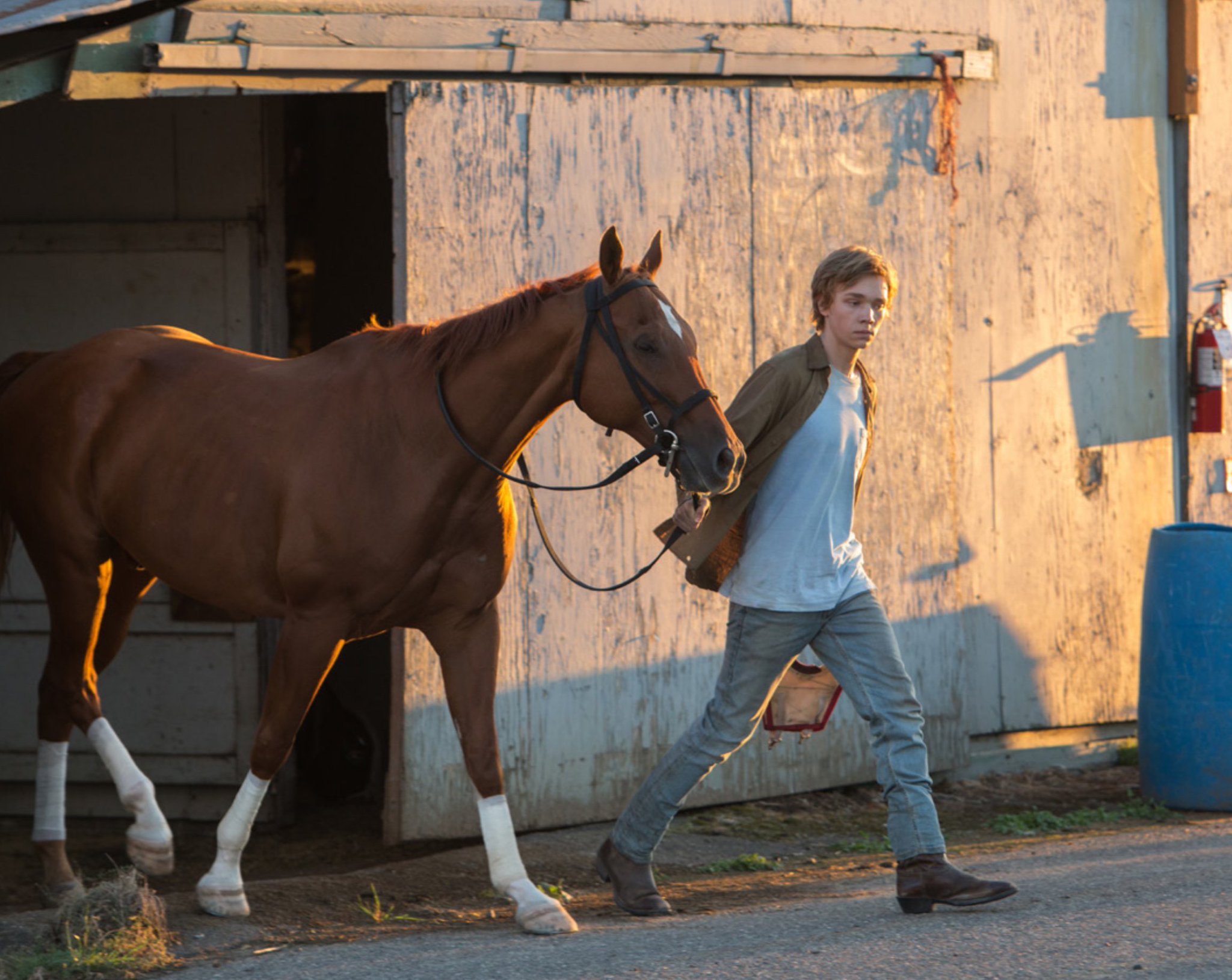Lean on Pete works on the strength of a terrific performance from young star Charlie Plummer as a down-on-his luck teen who befriends a past-his-prime racehorse. The pair teams up for a leisurely trek across the West in a modest movie that has a kindness of heart, even when its structure meanders, dissipating its focus. Adapted from his novel by screenwriter Willy Vlautin and directed by Andrew Haigh (45 Years, Weekend), it’s a movie of moments, if not momentum.
Sixteen-year-old Charley (Plummer) lives a rural, doldrums life with his devil-may-care, laborer dad (Travis Fimmel, overstated). In this opener, Haigh capably sets up a portrait of the working poor as a day-to-day monotony of odd jobs, cash and transients. The teen whiles away the summer hours jogging the small-town milieu, and it is on one of these runs that he first spies a broken-down racehorse named Lean on Pete—and it is love at first sight.
Charley quickly takes a job cleaning stables for the horse’s two-bit trainer (Steve Buscemi), befriending the horse’s jockey (Chloe Sevigny, solid) who, like Lean on Pete, is well past her glory days. The care and feeding of the horse becomes Charley’s responsibility, and it isn’t long before this unlikely family begins traveling the small-time racing circuit. This spirit of heartland Americana populated by precisely drawn characters is involving; we like them and care for them.
Things get complicated after Lean on Pete suffers a few losses, and Charley quickly surmises that the horse is about to be shipped “down to Mexico,” which is code for being put out to pasture, which is code for something else. With this writing already on the wall and the arrival of an unexpected family trauma, the youth steals Pete, setting out on a nearly 1000-mile trek back to a long-lost aunt (Alison Elliot, The Spitfire Grill), whose whereabouts are anybody’s guess.
Their journey is episodic, informed by a growing awareness of the world as a very tough place where survival requires both the kindness of strangers and Charley’s developing street smarts across a number of port-in-a-storm encounters, some providing respite and others worse.
Among them is a telegraphed sequence where Charley sneaks into a comfortable, middle-class home to wash his clothing and thematically reinforce what he will likely never have. He also takes up with a pair of malcontents (Steve Zahn is particularly good) from a local homeless shelter, who offer him a place to spend the night. We know better, but his naivete and need gets the best of him. There’s also a sad moment late in the picture where he confronts the reality of his homelessness, and another where he asks for a simple kindness he does not expect to receive, tempering his expectations.
These and other scenes are strong stuff in a relatively simple narrative. When the film focuses on the budding relationship between the boy and his horse—and the potential deliverance from misfortune and loneliness by finding someone to love and be able to rely on—it can be quite affecting. Yet nearly an hour into Lean on Pete a plot changing event occurs, which takes the film into a different direction that is decidedly less satisfying, a cool detachment informing its final scenes.
Plummer is largely what makes the film worthwhile. As in his frantic performance as the kidnapped Getty heir in last season’s All the Money in the World, he’s again in extremes, playing the cards life deals him, rolling with its sucker punches forced to grow up too quickly. The young actor makes for such an empathetic soul that even when the film threatens to run out of gas in its final stretches, he’s immensely worthy of our care.
Director Haigh, as he displayed in 45 Years where Oscar-nominated Charlotte Rampling made a late-life discovery that threw her identity into question, shows a fine ability to observe small character shifts, many wordless. Perhaps my favorite was a late moment where Charley does an honest day’s work house painting and receives his pay, Haigh’s camera lingering on his fully felt reaction.
What we remember, when this subtle movie concludes, is a nice kid making his way with nothing and nobody except his new best friend, and how he recreates a family for himself through this relationship, even when it turns tragic. Lean on Pete is a movie of simplicity about a lost child of the world whose already small world closes in tightly, and how he makes a way out and a way for himself.
2 1/2 stars.



